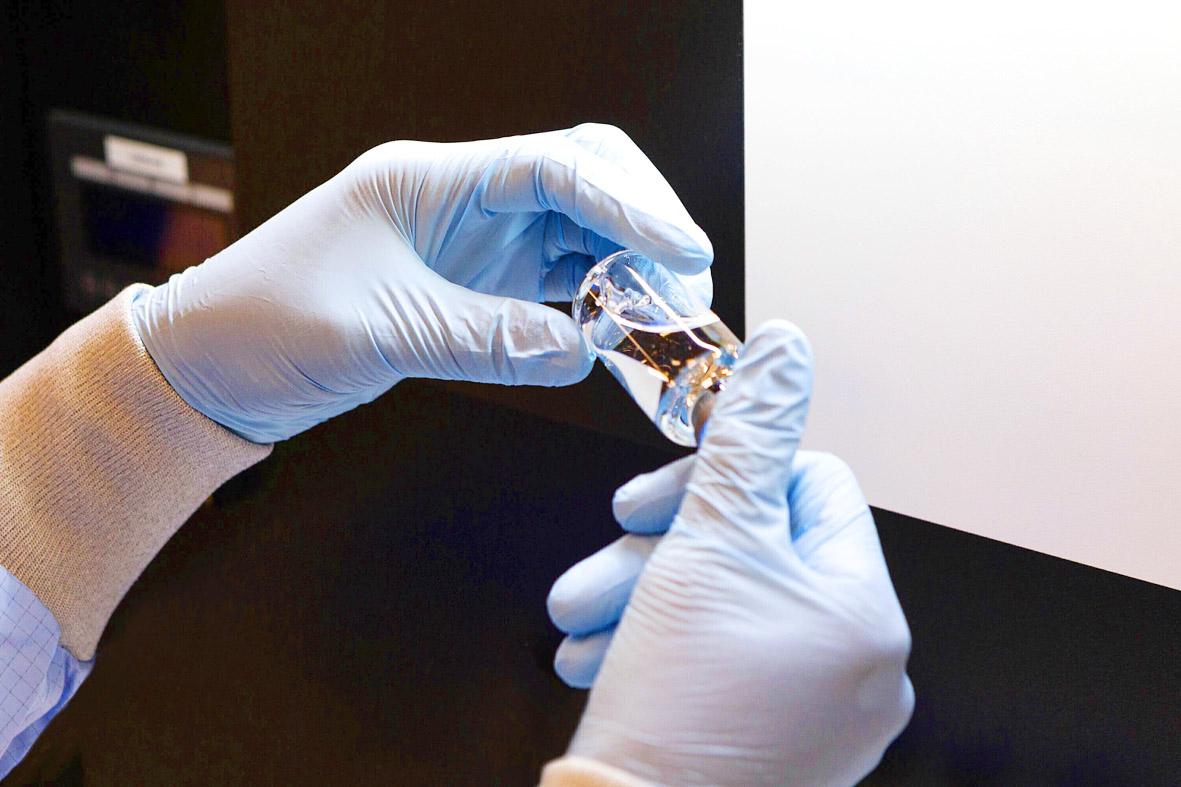More than half of a group of severely ill COVID-19 patients improved after receiving an experimental antiviral drug, although there is no way to know the odds of that happening without the drug, because there was no comparison group, doctors said on Friday.
The results published in the New England Journal of Medicine are the first in COVID-19 patients for remdesivir.
The Gilead Sciences drug has shown promise against other coronaviruses in the past and in lab tests against the one causing COVID-19, which has claimed more than 100,000 lives.

Photo: AP
No drugs have been approved for treating the disease. At least five large studies are testing remdesivir, and the company also has given it to more than 1,700 patients on a case-by-case emergency basis.
Friday’s results are on 53 of those patients, ages 23 to 82, hospitalized in the US, Europe, Canada and Japan. Thirty-four of them were sick enough to require breathing machines.
All were given the drug intravenously for 10 days or as long as they tolerated it.
After 18 days on average, 36 patients, or 68 percent, needed less oxygen or breathing machine support.
Eight others worsened. Seven patients died, nearly all of them older than 70.
The 13 percent mortality rate is lower than seen in some other reports, but no true comparisons can be made without a study rigorously testing the drug in similar groups of patients, the authors said.
A dozen patients had serious problems, but it was not clear whether they were from the drug or their disease. Those included septic shock and trouble with kidneys and other organs. Four discontinued treatment because of health problems they developed.
“It looks encouraging,” said Elizabeth Hohmann, an infectious disease specialist at Massachusetts General Hospital who is helping lead one of the studies testing the drug.
The problems that occurred were not unexpected given the disease, she said.
Derek Angus, critical care chief at the University of Pittsburgh Medical Center who was not involved with the research, said the recovery rate is good, but “there is no way of knowing from this series if remdesivir was helpful.”
“We cannot draw definitive conclusions from these data, but the observations from this group of hospitalized patients who received remdesivir are hopeful,” said lead author Jonathan Grein, director of hospital epidemiology at Cedars-Sinai Medical Center in Los Angeles, in a statement from Gilead.
The Foster City, California-based company provided the medication and also helped analyze the results.
Results from more rigorous studies are expected by the end of this month.
Additional reporting by Bloomberg

US President Donald Trump yesterday announced sweeping "reciprocal tariffs" on US trading partners, including a 32 percent tax on goods from Taiwan that is set to take effect on Wednesday. At a Rose Garden event, Trump declared a 10 percent baseline tax on imports from all countries, with the White House saying it would take effect on Saturday. Countries with larger trade surpluses with the US would face higher duties beginning on Wednesday, including Taiwan (32 percent), China (34 percent), Japan (24 percent), South Korea (25 percent), Vietnam (46 percent) and Thailand (36 percent). Canada and Mexico, the two largest US trading

AIR SUPPORT: The Ministry of National Defense thanked the US for the delivery, adding that it was an indicator of the White House’s commitment to the Taiwan Relations Act Deputy Minister of National Defense Po Horng-huei (柏鴻輝) and Representative to the US Alexander Yui on Friday attended a delivery ceremony for the first of Taiwan’s long-awaited 66 F-16C/D Block 70 jets at a Lockheed Martin Corp factory in Greenville, South Carolina. “We are so proud to be the global home of the F-16 and to support Taiwan’s air defense capabilities,” US Representative William Timmons wrote on X, alongside a photograph of Taiwanese and US officials at the event. The F-16C/D Block 70 jets Taiwan ordered have the same capabilities as aircraft that had been upgraded to F-16Vs. The batch of Lockheed Martin

China's military today said it began joint army, navy and rocket force exercises around Taiwan to "serve as a stern warning and powerful deterrent against Taiwanese independence," calling President William Lai (賴清德) a "parasite." The exercises come after Lai called Beijing a "foreign hostile force" last month. More than 10 Chinese military ships approached close to Taiwan's 24 nautical mile (44.4km) contiguous zone this morning and Taiwan sent its own warships to respond, two senior Taiwanese officials said. Taiwan has not yet detected any live fire by the Chinese military so far, one of the officials said. The drills took place after US Secretary

THUGGISH BEHAVIOR: Encouraging people to report independence supporters is another intimidation tactic that threatens cross-strait peace, the state department said China setting up an online system for reporting “Taiwanese independence” advocates is an “irresponsible and reprehensible” act, a US government spokesperson said on Friday. “China’s call for private individuals to report on alleged ‘persecution or suppression’ by supposed ‘Taiwan independence henchmen and accomplices’ is irresponsible and reprehensible,” an unnamed US Department of State spokesperson told the Central News Agency in an e-mail. The move is part of Beijing’s “intimidation campaign” against Taiwan and its supporters, and is “threatening free speech around the world, destabilizing the Indo-Pacific region, and deliberately eroding the cross-strait status quo,” the spokesperson said. The Chinese Communist Party’s “threats